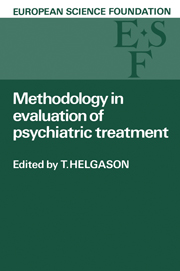 Methodology in Evaluation of Psychiatric Treatment
Methodology in Evaluation of Psychiatric Treatment Book contents
- Frontmatter
- Contents
- Participants
- Foreword
- Preface
- INTRODUCTION
- Evaluation of Psychiatric Treatment
- The Aims of Psychiatric Treatment
- Evaluation in Mental Health Programmes
- I METHODS OF CLASSIFICATION
- II EVALUATION CRITERIA
- III RATING METHODS IN EVALUATION OF TREATMENT
- IV OTHER QUANTITATIVE METHODS OFEVALUATION OF TREATMENT
- V ETHICALAND PRACTICAL PROBLEMS
- Index
Evaluation of Psychiatric Treatment
from INTRODUCTION
- Frontmatter
- Contents
- Participants
- Foreword
- Preface
- INTRODUCTION
- Evaluation of Psychiatric Treatment
- The Aims of Psychiatric Treatment
- Evaluation in Mental Health Programmes
- I METHODS OF CLASSIFICATION
- II EVALUATION CRITERIA
- III RATING METHODS IN EVALUATION OF TREATMENT
- IV OTHER QUANTITATIVE METHODS OFEVALUATION OF TREATMENT
- V ETHICALAND PRACTICAL PROBLEMS
- Index
Summary
Introduction
For several reasons, interest in the development and improvement of objective and, as far as possible, uniform methods for the evaluation of desired effects and undesired side-effects of various psychiatric methods of treatment has increased enormously during the past few decades. The introduction of highly potent psychotropic drugs such as the phenothiazines, butyrophenones, tricyclic antidepressants and lithium, has enormously improved the treatment of patients with schizophrenic, depressive, manic and other syndromes. Of course, there are still many problems. We know little about the mechanisms of action of all these drugs, and we do not know enough about possible specificity of different drugs for particular syndromes. There are also side-effects. Some of these, such as tardive dyskinesia with antipsychotic drugs are quite severe. In the public mind there has been great alarm about rather mild troubles and there has been a tendency to overlook the benefit of these drugs and to consider them only as harmful. This also holds true for other somatic treatments such as electroconvulsive therapy (ECT) and still more for different forms of psychosurgery.
In several countries there has been during recent decades very great interest in various forms of psychotherapy. Unfortunately, this term has been used with a great number of meanings. It has been used to denote particular methods or groups of methods but also in a much more general sense. One group of methods is founded on psychodynamic theories. Here belongs psychoanalysis in its classical sense, a highly time-consuming method with one-hour treatment sessions several times every week, quite often for years. The evaluation of the therapeutic outcome is based mainly on comprehensive case reports, describing in detail the therapeutic process. An objective evaluation of psychoanalysis as a therapeutic method is difficult, but in at least some cases of neurotic disorders, there seems to be conspicuous improvement. However, the relation between the costs (for the individual or for society) and possible benefit, also has to be considered. It seems evident that psychoanalysis always will have to be reserved for a few, highly selected cases. Perhaps it will be of most value as a useful experience during the training of psychotherapists. There is now a growing tendency to apply a psychodynamic frame of reference in various, less time-consuming and, from a practical point of view, more useful ways.
- Type
- Chapter
- Information
- Methodology in Evaluation of Psychiatric TreatmentProceedings of a Workshop Held in Vienna 10–13 June 1981, pp. 3 - 32Publisher: Cambridge University PressPrint publication year: 1983


